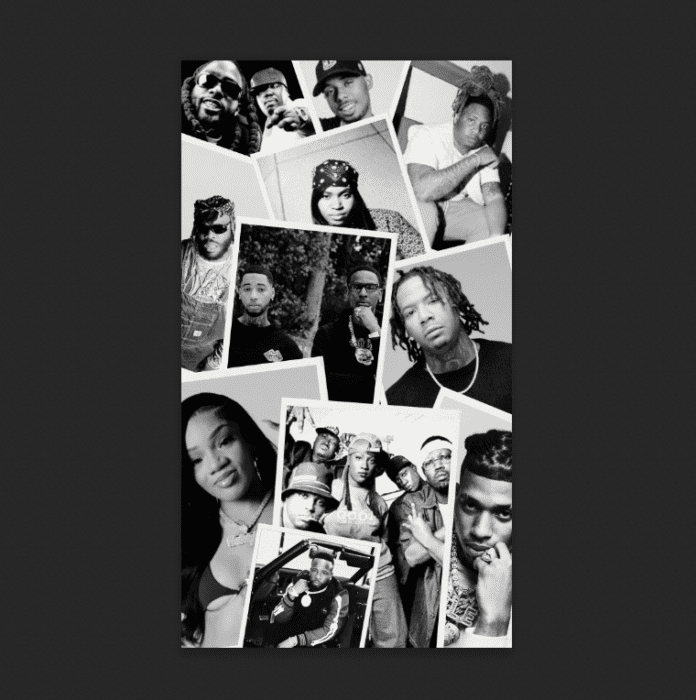“Memphis is hip-hop. Memphis is the influence. Memphis has always been the backbone of hip-hop. It’s been that way for a long time but now people are starting to know it.”
– Memphis hip-hop artist Kia Shine
Memphis has played a significant role in shaping the landscape of hip-hop over the past 50 years.

While cities like New York, Atlanta and Los Angeles often are cited as the birthplaces of hip-hop, Memphis has contributed to the genre in exceptional ways, particularly in the realms of rap/hip-hop music, production techniques, and the emergence of a distinctive Southern rap sound.
As a bustling city on the banks of the mighty Mississippi, Memphis, always has been a hub of musical influence. It’s no surprise then, that this city has left its indelible mark on the world of hip-hop, with over 50 years of artistic and cultural contributions to the genre.
From the soulful sounds of Stax Records in the 1960s and 1970s to the pioneering work of rappers like Three 6 Mafia and Yo Gotti in the 1990s and 2000s, Memphis has been a crucial force in shaping hip-hop into the vibrant, dynamic art form it is today.
At the heart of Memphis hip-hop is an extraordinary fusion of musical styles and cultural influences.
Drawing on the city’s rich musical heritage – from the blues and soul of Beale Street to the funky grooves of Booker T. & the MGs – Memphis hip-hop is both deeply rooted in tradition and fiercely innovative.
—
One of the key figures in Memphis hip-hop is DJ Spanish Fly, a pioneering DJ and producer who helped establish the city’s hip-hop scene in the late 1980s and early 1990s.
Spanish Fly’s iconic mixtapes – featuring local rappers like DJ Squeeky, Playa Fly, and Gangsta Pat – helped spread the sound of Memphis hip hop everywhere, inspiring a generation of artists both inside and outside the city.
Their particular use of sampling, including slowed-down and chopped-up samples, became a hallmark of Memphis rap production. This influence is heard in the “chopped and screwed” style that later emerged in Houston.
Tommy Wright III, often referred to as the “King of Memphis Underground Rap,” has had a major influence on the Memphis hip-hop scene.
Active since the early 1990s, Wright is known for his gritty, raw, and DIY approach to rap, contributing to the development of the Memphis underground rap style.
His music often features dark and menacing production, characterized by heavy bass, eerie melodies, and aggressive beats.
This style has become a defining element of Memphis hip-hop.
More recently, Wright received a song writing credit on Beyonce’s ‘Renaissance’ album; on the opening track, “I’m That Girl” you can hear the sample from his 1995 song “Still Pimpin,” featuring the late Princess Loko.
Wright’s enduring influence is a testament to the lasting impact of his contributions to the genre.
—
Triple 6 Mafia, later known as Three 6 Mafia, is arguably the most influential hip-hop group to come out of Memphis. Their dark and gritty production style, along with horrorcore themes in their lyrics, had a profound impact on the genre.
The group’s influence can be heard in many contemporary hip-hop artists, such as A$AP Rocky, Cardi B, Migos, Travis Scott, and Kanye West, and member Juicy J continue to contribute to the industry today, collaborating with artists like, Megan Thee Stallion, Rae Sremmurd, Drake, and Usher.
Wright’s music, along with Three 6 Mafia, played a role in the development of horrorcore, a subgenre of hip-hop that incorporates dark and macabre themes. This influence is seen in the use of horror-inspired imagery and lyrics in Memphis rap.
Artists like Project Pat, Lil Wyte, 8 Ball & MJG, Yo Gotti and Frayser Boy, also brought Memphis hip-hop to a wider audience, influencing the sound of hip-hop across the country and around the world.
Memphis artists introduced a different flavor to hip-hop with their distinctive drawls, storytelling, and use of Memphis slang.
—
While the Memphis hip-hop scene often has been dominated by male artists, there are several influential women who have made significant contributions to the genre in the city.
As a member of the iconic group Three 6 Mafia, the late Gangsta Boo gained prominence as one of the few female artists in the Memphis hip-hop scene during the 1990s. Her bold and assertive style contributed to the group’s success, and she later pursued a solo career.
Much like Boo, La Chat is known for her gritty lyrics and Southern rap style. La Chat solidified her presence in the Memphis hip-hop scene oftentimes going verse to verse with her male counterparts.
Today, Memphis continues to be a vital force in hip-hop, with artists like Yo Gotti, the late Young Dolph, and Moneybagg Yo carrying on the city’s rich musical tradition.
“Drake is the biggest hip-hop artist in the world right now! The No. 1 artist in the game gets a lot of his content and sauce from Memphis,” Shine said.
“I have co-writing credit on Drake’s first breakout record ‘Best I Ever Had’ and Memphis producer Tay Keith has produced two of his biggest records out right now.”
Tay Keith has worked with Future, Travis Scott, and even Beyoncé, not to mention nearly every major artist from Memphis. But there is one name he puts before anyone else.
“Making beats for Drake was and still is my main priority,” says Keith.
In 2018, Keith made his mark when Drake took notice of the tracks he had collaborated on with fellow Memphis artist BlocBoy JB.
This marked the beginning of a buzz that transcended Memphis, thrusting the local rap sound into the spotlight.
Tay Keith achieved his first major success at 21 with Drake and BlocBoy’s “Look Alive.”
Much like Tay Keith, Memphis has a rich history of influential producers who have played a significant role in shaping the city’s distinctive hip-hop sound.
Memphis undeniably has the hottest producers in the hip-hop industry, such as Drumma Boy, Jazze Pha, Kingpin Skinny Pimp, Teddy Walton, Al Kapone, HitKidd, Memphis Track Boy, IMAKEMADBEATS, J.P. on Tha Track.
In recent years, a host of burgeoning talents have surfaced within the Memphis hip-hop scene. Notable among them are Key Glock, NLE Choppa, Pooh Shiesty, Glorilla, Duke Deuce, Gloss Up, Big 30, K. Carbon, Blac Youngsta, Slimeroni, Aleza, and FTO Sett.
The influence of Memphis on hip-hop is as undeniable as it is enduring.
Memphis has left an indelible mark on hip-hop over the past 50 years through its contributions to Southern rap, innovative production styles, the influence of key artists, producers and groups, and the development of unique subgenres.
The city’s impact continues to resonate in hip-hop, highlighting its influence on the genre.



